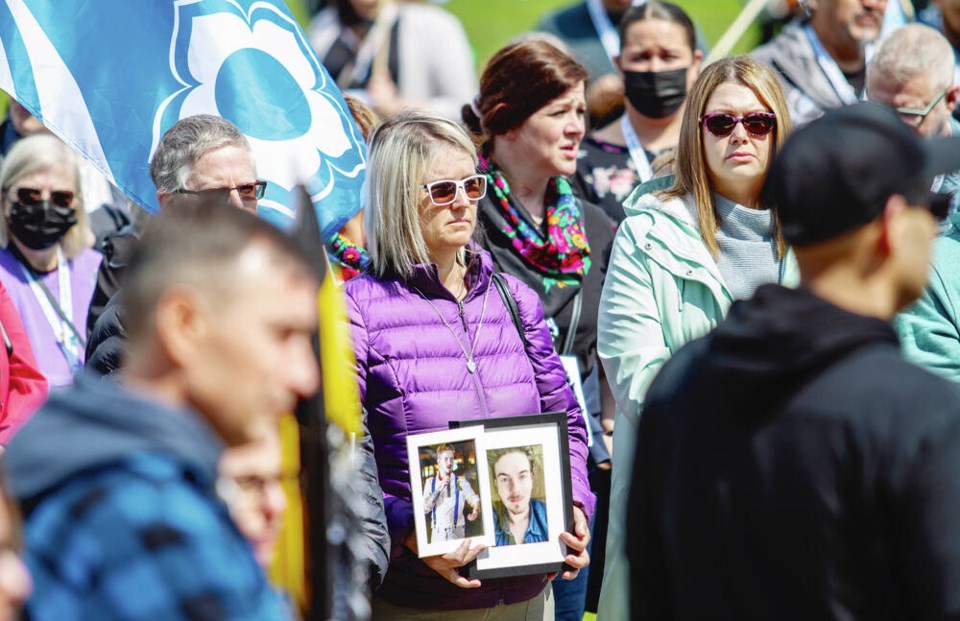Chris Souchuck lost her son, Josh, on March 2, 2020.
The 24-year-old driver had just arrived at work at Sysco Victoria, a food distribution company, when he was struck by an outgoing semi-truck and died.
“It’s pretty raw, still,” the Port Alberni mother said Thursday as she cradled photos of her handsome son at the Day of Mourning at the B.C. legislature.
About 500 people gathered on the legislature lawn to remember their loved ones and share their grief, and to remind the province and employers that high safety standards are paramount for all workers.
The death toll is rising in workplaces across British Columbia.
Last year, 161 people lost their lives in accidents or because of disease while on the job — up from 131 deaths in 2020 and 140 in 2019.
Flags were flown at half mast as thousands rallied together in different towns and cities across B.C.
For Souchuck, it was the first chance she had had to publicly mourn her youngest son, Josh, who, she said, was blessed with good nature and a sense of humour.
She said Josh’s death came at the start of the pandemic and that meant no in-person counselling and very little contact with her community, sending her into “a deep grief” where she hardly left the house.
“For me, it feels like Josh’s accident happened two months ago, not two years ago. I’m still in a state of shock,” said Souchuck. “I owed it to Josh to be here. This is really the first time I’ve been anywhere since it happened.”
She said gathering with others who have experienced deep loss “helps us … it’s part of the healing.”
Since the accident, Souchuck said Sysco has changed its parking and loading areas, separating its employee parking and the line of trucks with fencing, and added improving lighting. The company also donated $10,000 in her son’s memory to the Threads of Life, which provides supports for families suffering workplace tragedies.
Souchuck had worried about her son driving on the highways, but never could have imagined Josh’s life cut so short “by a freak accident where he happened to be in the driver’s blind spot” in the company’s yard.
She said Sysco made important changes “so history doesn’t repeat itself.”
Souchuck said her other son is married and the couple had a baby, which has helped her through the grieving process.
The B.C. Federation of Labour had a strong message for employers.
“We gather to mourn and remember,” said Laird Cronk, president of the federation. “We also commit to action to making workplaces safer and to holding those responsible for worker death and injury to account.
“For the past two years, working people have been putting themselves on the line to get our province through this pandemic.
“We owe it to them — and to their families — to ensure every one of them comes home safe and healthy at the end of the working day.”
Of the 161 people who lost their lives while on the job last year, 149 were men and 12 were women — the latter total more than double in each of the five previous years, according to WorkSafeBC. The provincial agency said nearly three work-related death claims were accepted each week last year.
Among the deaths, two workers were under 25, and 13 died as a result of exposure to COVID-19 in the workplace.
Across the province, 99 workers died as a result of occupational disease, including 53 to asbestos exposure.
Traumatic injuries on the job accounted for 47 deaths, including nine in the forestry industry and nine in wood and paper mills.
Deaths in the woods have continued this year.
On Monday, 46-year-old logger Lonnie Hyrhorka died in Campbell River Hospital after after sustaining severe spinal injuries in an accident near Woss on April 13, when a tree fell on him.
On April 8, experienced pilot Brent Fedirchuk died when the helicopter he was piloting to fly shake blocks out of a cut crashed near Sayward.
Anne Naser, president of WorkSafeBC, said the Day of Mourning is a time to remember that the key to healthy and safe workplaces lies in action that involves everyone — employers, workers, supervisors and other stakeholders.
“We all have a role to play, and when we work together to fulfil our responsibilities, we reduce the risk of injury, illness, and death,” she said.
“Workers have the right to a healthy, safe, and respectful workplace, and employers have the responsibility for creating it.”
Last year, the construction sector was the hardest hit for workplace deaths with 28, followed by the transportation and public administration sectors with 20 each, then mining and related industries with 16.
The majority of deaths, 56, were in the Lower Mainland. On Vancouver Island, 22 workers died — six in the capital region, four each in the Cowichan Valley, Mount Waddington and Strathcona, and two each in Nanaimo and Alberni Clayoquot.



